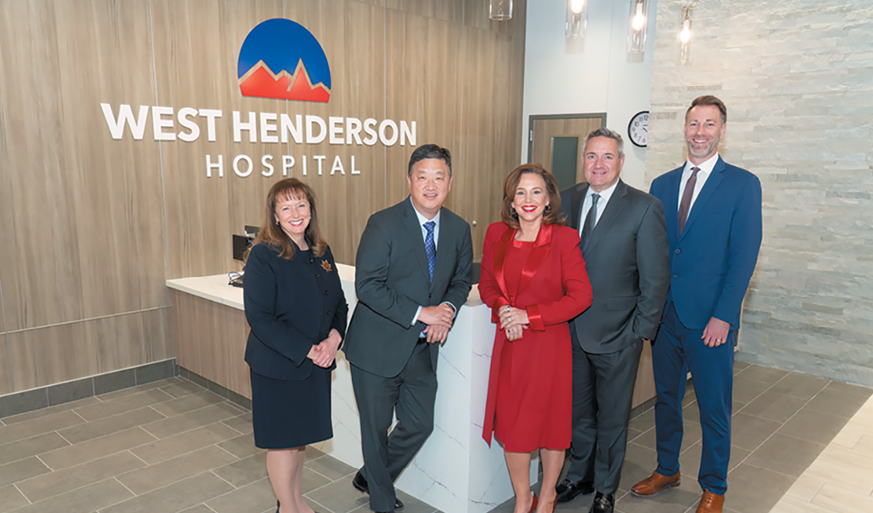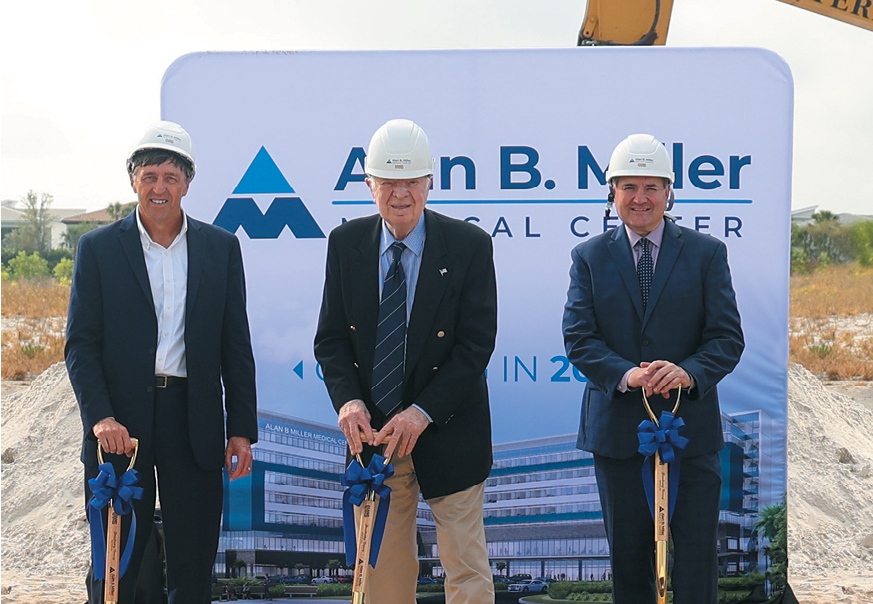- Home
- Media Kit
- MediaJet
- Current Issue
- Past Issues
- Reprints (PDF)
- Photo Specifications (PDF)
- Contact Us
- PRIVACY POLICY
- TERMS OF USE
![]()
ONLINE
![]()
ONLINE

Healthcare Excellence
Editors’ Note
Marc Miller is President and Chief Executive Officer of Universal Health Services. He was named CEO in January 2021 and has served as President since 2009. He is a member of the UHS Board of Directors, serving on the Executive Committee and the Finance Committee. Miller began his career at UHS in 1995 and over the years has held various positions of increasing responsibility at hospitals and at the corporate office. Prior to assuming executive leadership roles at the company’s corporate headquarters in King of Prussia, Pennsylvania, Miller served in various operating roles at several UHS Acute Care Hospitals. Among his regional and divisional management roles, he served as Group Director responsible for the company’s acute care operations in Pennsylvania, South Carolina, and Florida; Eastern Region Vice President of the Acute Care Division; Senior Vice President and Co-head of the UHS Acute Care Division; and President of the Acute Care Division. Miller is also a member of the Board of Directors of Universal Health Realty Income Trust, a real estate investment trust that has investments in 76 properties located in 21 states. In 2021, Miller was selected to serve on the Board of Directors of the Federation of American Hospitals (FAH). He currently serves as Chair-Elect, in advance of serving as Chair of FAH in 2025. Additionally, he has served as a member of the Board of Directors of Premier since 2015. In 2022, Miller was named to the Modern Healthcare Most Influential annual ranking at #49. He is frequently featured as a thought leader and provides industry perspective for national publications. Miller holds an MBA degree in healthcare from The Wharton School of the University of Pennsylvania and a BA degree in political science from the University of Vermont.
Company Brief
One of the nation’s largest and most respected providers of hospital and healthcare services, Universal Health Services, Inc. (uhs.com) has grown into a Fortune 300 corporation with annual revenues during 2023 of approximately $14.3 billion. In 2024, UHS was again recognized as one of the World’s Most Admired Companies by Fortune; ranked #299 on the Fortune 500; and ranked #399 among U.S. companies on Forbes Global 2000 World’s Largest Public Companies. Headquartered in King of Prussia, Pennsylvania, UHS has approximately 96,700 employees and through its subsidiaries operates 28 inpatient acute care hospitals, 333 inpatient behavioral health facilities, 40+ outpatient facilities and ambulatory care access points, an insurance offering, a physician network, and various related services located in 39 U.S. states, Washington, DC, Puerto Rico, and the United Kingdom. It acts as the advisor to Universal Health Realty Income Trust, a real estate investment trust.

Marc Miller leads the celebration during Veterans Day,
recognizing and thanking UHS employees who are
veterans and also recognizing staff who serve veterans
at its hospitals
How do you describe Universal Health Services’ culture and values?
We are proud to commemorate 45 years of healthcare excellence this year, signifying Universal Health Services’ longstanding commitment to delivering high-quality care to the patients we are privileged to serve. It’s all about care for everyone in the communities where we operate our facilities. We’ve built our reputation through our focus on healthcare excellence and by living our principles every day, at each and every encounter: providing superior quality patient care, valuing each member of our team, being a highly ethical provider, and serving our local communities. Our culture of service excellence focuses on trust, teamwork, compassion, and innovation.

On a visit to Southwest Healthcare Rancho Springs Hospital
in Murrieta, California, Marc Miller signs the vision wall
Will you provide an overview of UHS’ services and capabilities?
Through its subsidiaries, UHS operates medical-surgical hospitals and behavioral health facilities. We are the preferred provider in key markets served with robust integrated care networks that comprise hospitals, ERs, surgery centers, ambulatory care centers, and alignment with physician practices. Our facilities are regularly honored by national, state, and local organizations for delivering high-quality care, pioneering innovation, thought leadership, and for their commitment to serving their local communities.
We are strong, growing, and competitively positioned to meet the increasing demand for the vital healthcare services we provide. We are investing in extending our offerings across the continuum of care – from hospitals, outpatient specialty facilities, freestanding emergency departments, and urgent care centers to home health and telehealth. In 2023, our staff proudly cared for 3.6 million patients.

In November 2024, Marc Miller (second from right) and team
open the brand-new 150-bed West Henderson Hospital
in Henderson, Nevada
What have been the keys to UHS’ strength and leadership in the industry?
Our consistency in support of our mission is key to our success. We prioritize providing high-quality care to our patients above all else. Our strategy includes building or acquiring hospitals in rapidly growing markets, investing in the people and equipment needed to allow each facility to thrive, and becoming the leading healthcare provider in each community we serve.

In March 2023, UHS ceremoniously named and broke ground
on a de novo hospital in Palm Beach Gardens, Florida.
The Alan B. Miller Medical Center is named in honor of UHS Founder
and Executive Chairman, Alan B. Miller, who was CEO
until 2021 when he transitioned responsibilities to
Marc Miller (above and below)
Where do you see the greatest opportunities for growth for UHS?
Further expanding in core markets is a key priority for our investments. During 2024, our Acute Care Division has had three medical-surgical hospitals under construction. We just opened the brand-new West Henderson Hospital in Henderson, Nevada, our sixth hospital in the Southern Nevada region. We are building Cedar Hill Regional Medical Center GW Health in Washington, DC, and we are on schedule to open in spring 2025. And the Alan B. Miller Medical Center is under construction in Palm Beach Gardens, Florida, on track to open in early 2026. In the Behavioral Health Division, through partnership with Trinity Health, Southridge Behavioral Hospital is under construction and on schedule to open in early 2025 in Grand Rapids, Michigan. In the Northeast, through partnership with Lehigh Valley Health Network (LVHN), we anticipate opening Hanover Hill Behavioral Health in Hanover Township, Pennsylvania in 2025. In addition to the new hospitals, we are opening freestanding emergency departments in existing markets as well as adding outpatient locations for both physical and mental healthcare including substance use disorder treatment.

How do you balance the pressures to meet quarterly expectations as a public company with the need to make long-term investments for the future?
We have always prioritized making all decisions for the right reasons, keying on long-term success. We are focused on achieving our goals each month but will not compromise our strategic goals for short-term gains. We feel strongly that if we maintain this type of thinking we can continue to see high performance for both the short and long term. This approach continues to pay dividends. Investor’s Business Daily recently announced UHS among 19 stocks that outpace 99 percent of companies in terms of key stock-picking factors, testament to fiscal responsibility in providing value to investors.
How critical is it for UHS to build a diverse and inclusive workforce to mirror the diversity of the patients and communities it serves?
Our workforce is a reflection of the communities that we serve. Our primary goal is to hire and maintain a workforce that is best suited to care for our patients in the various markets where we have operations. In most cases, that workforce closely reflects that particular community. We value the skills, knowledge, talents, dedication, and the contributions of our team members, at all levels and in all functions across the organization. We offer professional development opportunities, support employee engagement, promote recognition and award programs, and actively pursue community outreach opportunities.
“Our mission and complete focus is to ensure that we serve our patients to the best of our ability.”
What do you see as UHS’ responsibility to be a good corporate citizen and a force for good in society?
Our mission and complete focus is to ensure that we serve our patients to the best of our ability. We have the responsibility of trying to help those patients heal in a variety of ways, and it is through this work that we fulfill our need to be a good corporate citizen and clearly demonstrate that we are a tremendous force for good in society.
What do you feel are the keys to effective leadership and how do you approach your management style?
The most important key is to lead by example, by modeling the behaviors I expect of others. I demonstrate accountability and transparent decision making and welcome my colleagues’ various points of view. I am competitive and want to win but realize that challenges will always occur. It’s how you react to it, handle it, and address it with calm measure that matters. For me, this is the best approach.
You have been with UHS for 30 years. What has made the experience so special for you?
Early in my career, I held a number of positions of increasing responsibility within our hospitals – in Washington, DC, in Florida, and in Pennsylvania. This afforded me opportunities to garner a deep understanding of the inner workings and challenges of the front line – and has been the core backdrop for informing much of my decision making since. I value visits to our facilities and engagement with our local leaders to continue to see first-hand the challenges that they deal with on a daily basis.
I am also a voracious reader about all things leadership. I try to learn from other top companies, and top leaders in all walks of life, to find great ideas that can help UHS succeed, as well as avoid possible mistakes.
Our continued success, over so many years, has made the experience very rewarding.
What advice do you offer to young people entering the industry?
First, be self-aware. Understand your weaknesses and work on them. Be conscious about your strengths and weaknesses – and those of others. Next, be empathetic to the needs of others. Understand daily work life in the hospital setting. Understand how taxing the day is and what patients are experiencing. Finally, make decisions for the long term – do things for the right reasons, for the long term.![]()